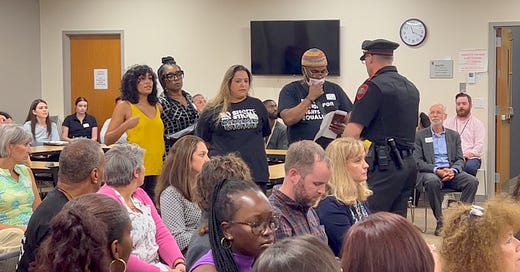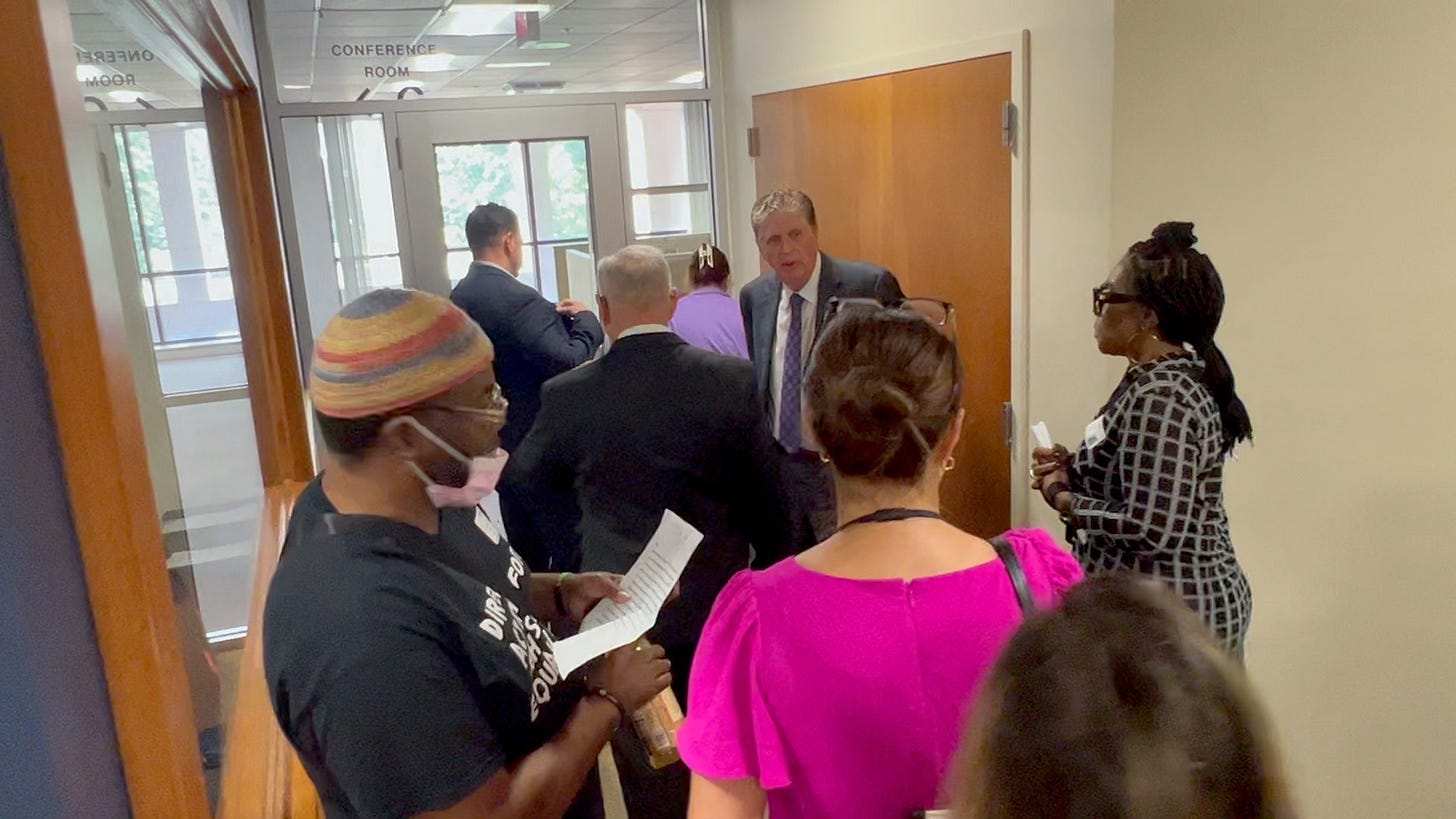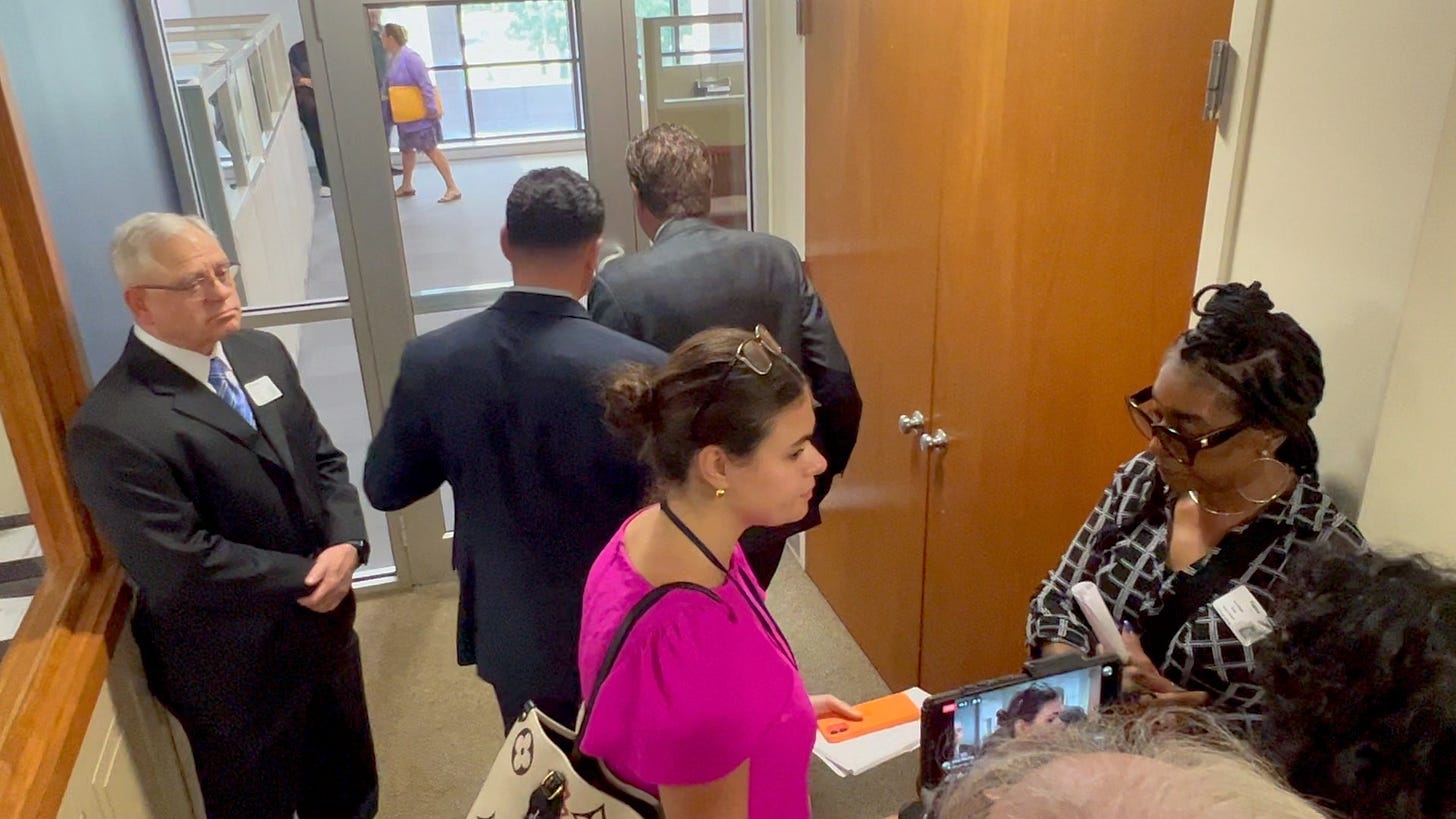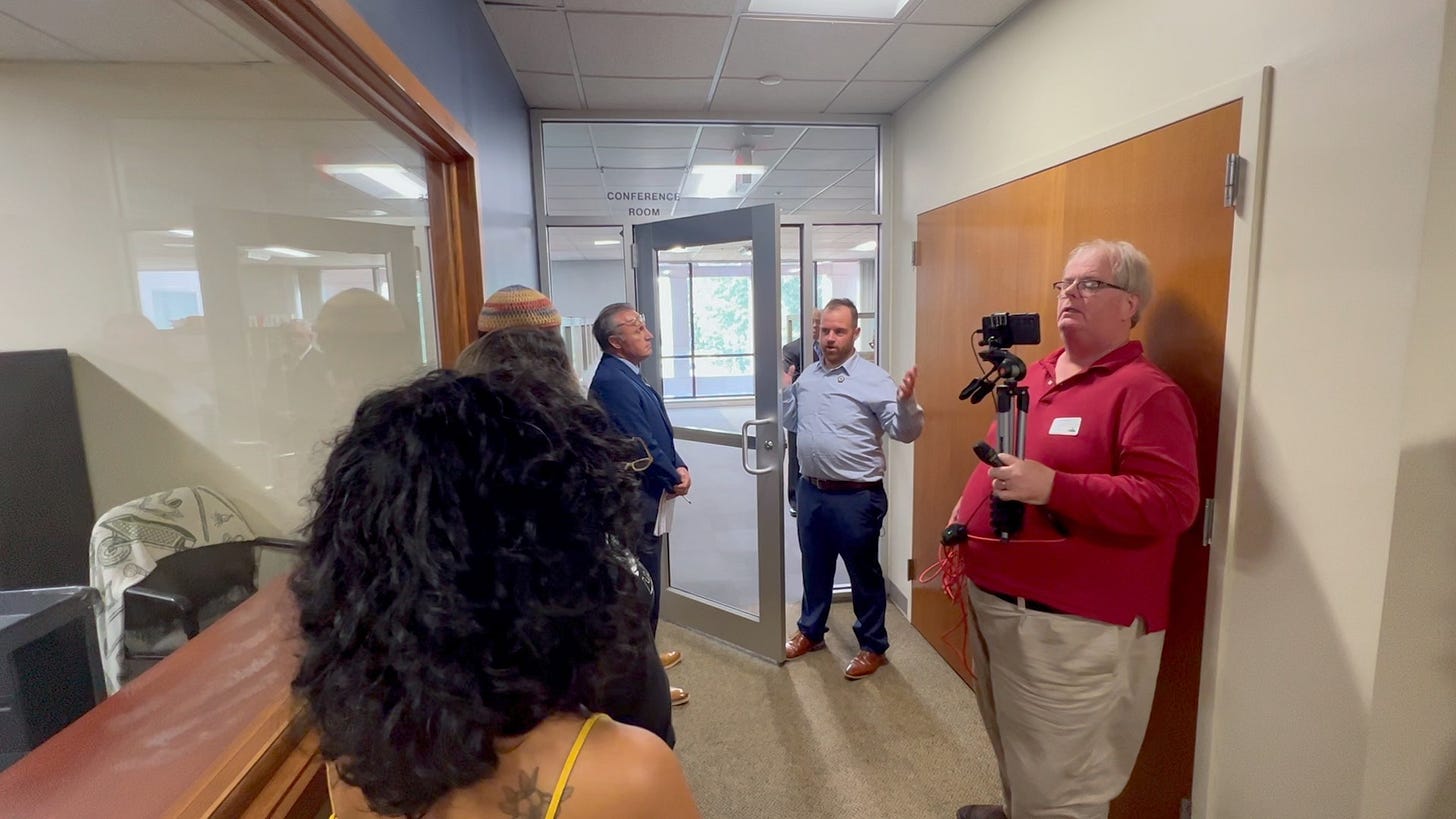DARE confronts Governor McKee over ACI deaths, Governor refuses to meet publicly
Though the protesters wanted to speak to the Governor publicly, with press present, the Governor excluded the press from attending.
Members of DARE (Direct Action for Rights and Equality) disrupted Rhode Island Governor Daniel McKee’s Overdose Prevention and Intervention Task Force on Wednesday, shortly after the Governor signed a proclamation declaring September as Recovery Month in the state. Channel 12 covered the task force meeting here, but did not report about the protest.
DARE’s Behind the Walls Committee is made up of Rhode Islanders impacted by incarceration in Rhodes Island. They have been raising the alarm about a rash of deaths at the Rhode Island Adult Correctional Institutions (ACI) and are asking for an investigation into the Rhode Island Department of Corrections (RIDOC) and the Rhode Island Brotherhood of Correctional Officers (RIBCO), to no avail.
The processes are not working. It's been years and people are dying every year. People are dying, committing suicide. People are dying because of solitary confinement. Are we supposed to wait more years for this? Is this process working if people are dying, is this process working?
As the Governor displayed the signed proclamation, Meloni Perez, who leads the Behind the Walls Committee, rose and spoke. The following is a transcript, edited for clarity.
Meloni Perez: Governor McKee, what about the seven deaths that happened at the ACI? What about those seven deaths? They're suspicious, Governor McKee. You need to put an external investigation into RIBCO and the ACI. Governor McKee, you need to hear us. We keep calling on you and you're not answering us. Governor McKee, there needs to be an external investigation into the Rhode Island prisons...
Governor Daniel McKee: I'm happy to meet with you, but that's disrespectful to the audience that is here today, dealing with a very important issue...
Meloni Perez: You keep disrespecting us and not telling us, not answering us...
Governor McKee: I would ask you to just be respectful and to let the group here do the work that they are here to do...
Anusha Alles [Interim DARE Director]: I think the audience here has an investment in hearing about what's happening in our prisons. People who are impacted by substance use are people who are going in and out of these prisons and it impacts people's recovery and their relapse. It's something that we have to talk about. We can't talk about overdose prevention without talking about our prisons torturing people.
Ronald Doyle [Member of DARE's Behind the Walls Committee]: Governor McKee...
Thomas Joyce [Task Force co-chair]: So, I'd just like to make a reminder that at the end of the meeting, we have a half hour - 30 minutes - of public comment that is going through there. So usually the beginning of the meeting is for the task force and our presentation.
Meloni Perez: Can you give us some time though, to talk to him, at a later date?
Thomas Joyce: We have 30 minutes at the end of the meeting for public comment.
Anusha Alles: We've gone to every single department. We've gone to the Department of Health. We've gone to DCAMM [Division of Capital Asset Management & Maintenance]. We have gone to every single [agency] that has oversight on this...
Ana Novais [Task Force Co-Chair]: Thank you everyone. I want to be respectful of the time. I want to encourage you to be respectful of our processes. We do have public comments at the end of the meeting, as my co-chair said and we appreciate you respecting that.
Anusha Alles: The processes are not working. It's been years and people are dying every year. People are dying, committing suicide. People are dying because of solitary confinement. Are we supposed to wait more years for this? Is this process working if people are dying, is this process working?
Ronald Doyle: Governor McKee, I'm a formerly incarcerated person with experience, firsthand, of the cruelty and the torture, as well as the harassment and racism...
police officer: [approaches]
Ronald Doyle: Don't touch me, I have a heart issue... at the hands of correctional institutional employees…
Ana Novais: Can you wait for the end of the meeting, please?
Ronald Doyle: No I cannot. I'd just like to get this out real quick. That way you can go about the meeting.
police officer: [approaches]
Ronald Doyle: Don't touch me. Don't touch me. Don't touch me. I have a heart issue. I've been invited as well. I'm asking just to be heard and that's it.
police officer: This is not the time for that.
Ronald Doyle: So why isn't it? Why is today not the time? We went looking for this man come Friday...
police officer: [approaching] We can take you out...
Ronald Doyle: Don't touch me. No, we can't. We can talk to him right here...
Ana Novais: We're going to continue and I just want to..
Ronald Doyle: Why wasn't the man around Friday when he needed to hear all this?
[Here Doyle is referring to an action DARE held on Friday night when they brought seven coffins to PVDFEST opening ceremonies to protest the ACI deaths.]
Protester: Governor, we need your help, that's all.
Ronald Doyle: I don't want to step outside. I just want to finish saying what I got to say and then that's it. Is there an issue with it? Well, then I think it's pretty much speech. Isn't that the American way? I'm not disrupting. The man did his speech. He was signing what he needed to sign in law. All we're asking is just to be heard.
police officer: Okay. But there's a time and place for that...
Ronald Doyle: We are here for the time and this is the place. What's the difference? Now you're making my body shake. You're peering, you know what I mean? I have a defibrillator which means you touch me, I'm falling out and if I do fall out I'm suing.
police officer: Okay.
Ronald Doyle: Alright then. So back up.
Governor McKee: C'mon. We're going to step out. C'mon.
Ronald Doyle: No, we can talk right here.
Governor McKee: You can meet me right [out] here. C'mon, we can talk outside.
Ana Novais: Thank you, Governor. We appreciate it.
The Governor led the protesters out of the meeting and into the hallway. The Governor was followed by communications staffers Matthew Sheaf and Olivia de Rocha.
Listen to me. I will meet with the people who are willing to meet. You want to come in and say hello. I'm willing to meet. [To the press] You're not invited.
In the hallway:
Protester: Nobody has investigated those seven deaths...
Governor McKee: We'll take a private meeting.
Olivia de Rocha: [to reporters] We'll do the gaggle after.
Steve Ahlquist: Why can't I be in this?
Olivia de Rocha: This is just... we're just going to talk to these people.
Steve Ahlquist: Would the people talking [to the Governor] like the press inside while they're doing this?
Protesters: Yes! Yes. Yes.
Daniel McKee: We're not bringing the press in.
Olivia de Rocha: No...
Anusha Alles: We're not having a background conversation. We're not doing it. We have been going to the governor's office. We've been dropping off petitions. We've been putting in complaints with every department...
Matthew Sheaff: Listen! He's willing to meet with you right now...
Governor McKee: Listen to me. I will meet with the people who are willing to meet. You want to come in and say hello. I'm willing to meet.
[To the press] You're not invited.
Anusha Alles: We want accountability...
Governor McKee: Listen to me. I'm going to tell you one more time. If you're respectful, I will meet with you. If you're not, I will meet with those who are respectful...
Anusha Alles: Don't be speaking to us about respect when people are being tortured! Do you know what respect means? What does respect mean in the context of people being denied medical care?
Steve Ahlquist: Matt! Why can't [the governor] talk publicly about this?
Ronald Doyle: What's the fear of this?
Steve Ahlquist: Why is he running away?
Pat Ford: What's the problem here? What are you afraid of?
The Governor and his staff walked through a glass door into a suite of offices and locked the door behind them.
They want to take us out of the room because they don't want to say it in front of people.
Protester: Excuse me. We have to go in.
Steve Ahlquist: No, he locked the door.
Protester: Who did he take in?
Steve Ahlquist: Nobody. His staff.
Protester: My grandson had a heart attack at the ACI, and they kept him in his cell for hours before they got medical attention. He passed away. They had to use a defibrillator on him. They're talking about all of these seven deaths. I don't want my grandson to be one of them, so we need this investigated. [To be clear, her grandson is currently alive at the ACI, and she is very worried about him.]
Anusha Alles: They want to take us out of the room because they don't want to say it in front of people.
Minutes later, Matthew Sheaff opened the door.
Matthew Sheaff: So the governor, like he said, is willing to meet with your group. He's willing to meet with anyone who wants to talk and work together. So we have a conference room. If you'd like to come in and meet with him. This isn't a press conference. It's a meeting. If you want to come up and meet with him, I'll take you back to meet with the governor. He wants to meet one-on-one with you. We're happy to talk to the media after. If you only want to do this in front of the media, then...
Protester: I'm willing to talk.
Matthew Sheaff: Alright, come on in.
Steve Ahlquist: Remember, this is a state where you can record. Feel free to record.
Matthew Sheaff: Right through there and then we're going to go right this way.
Steve Ahlquist: Why is [the Governor] afraid to speak to the media on this?
Matthew Sheaff: The Governor talks to you all the time...
Steve Ahlquist: No, he doesn't. That's a silly thing to say.
Matthew Sheaff: We do gaggles every day. He wants to meet with these people privately like they've asked and then we'll come out
Steve Ahlquist: They asked to meet [the governor] with the press and you reversed it and said meet with them alone.
Matthew Sheaff: He's willing to meet with people who want to meet with him. They want to meet with him. We're going to do the meetings…
Steve Ahlquist: But not publicly. He's just going to do it privately and make whatever promises he makes.
Matthew Sheaff: We'll talk to you after.
Not only did the Governor not meet with the press afterward, but Matthew Sheaff ignored a request for comment I sent via email.
Here’s the video:
The meeting, behind closed doors, lasted about 24 minutes. I spoke to the protesters afterward for their impressions.
“He seemed more interested in taking care of specific family members than in addressing the problem as a whole.”
“He was very much about respect, and his feeling that our approach wasn’t respectful enough.”
“I asked him if he knows what the process is for incarcerated people to report a problem or complaint, and he had no idea.”
“He objected to placing any blame on correctional officers, and defended them.”
“He didn’t promise any action.”
See also:









Respect is a convenient concept for those in power to use as a bribe, a shaming tactic, a cudgel, and certainly an excuse for inaction.
This scene makes me sick to read about. I am eternally grateful that you do this work and understand the stakes. The press is all that stands between us and fascism. Thank you for your bravery.